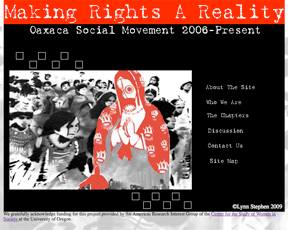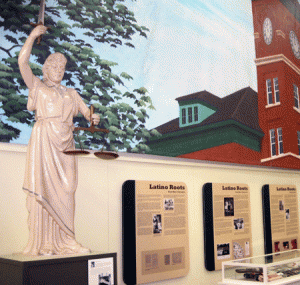Publications Resulting from CLLAS-Funded Research
“Discrimination, psychosocial stress, and health among Latin American immigrants in Oregon”
A collaborative project by Heather McClure, Charles R. Martinez Jr. and Mark Eddy of the Oregon Social Learning Center–Latino Research Team, Roberto Jimenez and Laura Isiordia of the Farmworker Housing Development Corporation, and Josh Snodgrass, anthropology professor at the University of Oregon. This project will gather health data related to psychosocial stress among Latino immigrant farmworkers in Woodburn, Oregon. (CLLAS funded)
Research Associated with the Center for Latino/a and Latin American Studies (CLLAS)
“Documentation of Huambisa and Aguaruna, two languages of the Peruvian Amazon,” by Jaime Pena (Department of Linguistics)
The aim of this project is to conduct fieldwork in two indigenous communities of Peru in order to collect linguistic (text data) and ethnographic data (with emphasis in socio-cultural organization and oral literature) from Huambisa (Wampis) and Aguaruna (Awajun) people, two related minority groups of the Peruvian Amazon. The biological wealth of the Amazon and the coexistence of ethnic groups with nature (from way before the creation of the Republic of Peru) are being altered nowadays without taking into consideration the lives of the inhabitants of this area. This situation worsens because of the lack of information (or because of the misinformation) about them and the inappropriate state education policy that does not promote the local languages and traditions. Huambisa and Aguaruna peoples are highly committed to preserve their identities through the study of their own cultures and languages. Despite the lack of resources to implement a systematic educational, environmental and language-preservation policy, local community organizations are working to cope with this situation. The project will provide training and technological resources to a group of men and women chosen by their own communities, who will do their own recording (this will include voice, video and photography). As part of my PhD research in the Department of Linguistics at the University of Oregon, I will go to the community as a volunteer to live there and try to learn the language. In the future, the data will be used to produce a grammar description and help the communities write textbooks and other materials for their local schools. (CLLAS Funded)
Video Project to Educate the General Public on Racism and Immigration Policy in the 2008 Election Debate
The project is a collaboration between Carrie Ann Tracy of the Northwest Federation of Community Organizations, and Irmary Reyes-Santos and Daniel Martinez HoSang, both ethnic studies professors at the University of Oregon. This project seeks to broaden the electorate’s understanding of issues related to immigration in the upcoming election cycle through the production of a 10 minutes-long slideshow video. The main version of the slideshow will be placed on Youtube.com. It will also be used to initiate conversations in NWFCO’s Community Dialogues Program, which attempts to bridge immigrant and non-immigrant populations. The sideshow is meant to contribute directly to discussions regarding racism and immigration policy in the 2008 election debate. It will provide a way to start having conversations about the role of race in anti-immigrant rhetoric, and the common ways in which racism impacts all communities of color in the United States, including immigrant communities. Copies of the slideshow video will be made available in DVD format to community organizations affiliated with NWFCO and to University of Oregon faculty. (CLLAS funded)
Immigration and Health Care, by Sarah Cribbs (Sociology Department)
This project explores how the healthcare industry is affected by new, non-English speaking im/migrant growth in cities with limited recent im/migrant history and identified as new destination cities for im/migrant growth. New destination cities are cities across the United States that have little-to-no history of attracting im/migrants, but experienced an increased growth in both new immigrants and migrants from other areas across the United States in the last ten-to-twenty years. These new destination cities are finding a need to adjust, accommodate, or change various institutions, organizations, and policies to meet the needs of newer groups, often which arrive in a city which is ill-equipped to deal with the structural and social changes necessary to serve this population. This project seeks to investigate the ways in which the administrators of one health care institution, St. Peter’s Health System, perceive the institution as adjusting (accommodating, and changing) and how those administrators of that institution frame those adjustments (accommodations, and changes) as its surrounding city is transformed into a new destination city for Spanish-speaking im/migrants. This study will examine both the macro-sociological phenomenon of immigration and social geography and the micro-sociological level of interaction influenced by racial attitudes. Thus, this study will contribute to immigration literature by examining the perceived impact of the changing demographics in the surrounding city (from a city with little-to-no immigration history to a new destination city) on the administrators of a health care institution and geographic placement of services relative to Spanish-speaking im/migrant population growth. Additionally, this study will contribute to sociology of race and ethnicity and social psychology by studying how the administrators within the institution frame the impact of immigration on their particular institution and how racialized attitudes may influence perceptions. This project will contribute to the understandings of new settlement communities across multiple disciplines: sociology (immigration, race relations, social-psychology, sociology of health, social inequality, and sociology of organizations) and geography. (CLLAS funded)
(Political) Being and Authenticity: The Philosophy of Race and the Possible Foundations for a “Hispanic Citizenship?” by Grant Silva (Philosophy Department)
Authenticity and originality have been crucial ideas in American social and political thought. Perhaps because all the nations of America stem from the same era of modern colonization, the search for freedom is bound to American identity. This project rethinks the meaning of “American.” In broad terms, it is an examination of the intersection of social identity and citizenship in the 21st century. More specifically, my project examines the idea of Estadounidense, Spanish for “citizen of the United States” or “Unitedstatesian.” This idea resolves a philosophical impasse regarding the role of cultural authenticity and self-identification inside of philosophical thought about race, all the while demonstrating its placement inside of U.S. national identity (albeit from different racial ideologies). Thus, this study examines the ways in which race in the United States is changing into something resembling the racial ideology of Latin America, where culture and class are factors in racial designation (at least more so than in the U.S.). Estadounidense is both an authentic national/cultural identity and a form of resistance to ethnocentric nationalistic beliefs; a type of political authenticity. As modern nation-states face 21st century post-modern problems, i.e. immigration, economic globalization, and ecological disaster, novel ways of thinking about what it means to be a citizen must be conceived. (CLLAS funded)
Making Rights a Reality: The Oaxaca Social Movement 2006 – present, website and book project (CSWS, CLLAS)
Making Rights a Reality website
 Research Team: Lynn Stephen, Alina Padilla Miller, Jesse Nichols, Magali Morales, Gabriela Martinez
Research Team: Lynn Stephen, Alina Padilla Miller, Jesse Nichols, Magali Morales, Gabriela Martinez
How people imagine themselves as citizens has increasingly been influenced by global rights discourses. This website explores acts of testimony and their links to global discourses of human, women’s, and indigenous rights in the southern Mexican state of Oaxaca. Testimonials here are urgent oral accounts of bearing witness to wrongs committed against the speakers. Broadcast on the radio, television, at public demonstrations, and in the street, testimonial rights claiming repositions previously excluded speakers as active citizens instead of as folkloric parts of the landscape. This project centers on a recent and ongoing social movement in Oaxaca, Mexico and the emergence in June 2006 of the Popular Assembly of the Peoples of Oaxaca (APPO), a coalition of over 200 organizations that effectively ran the city for six months until the Mexican federal police force intervened. The APPO continues to be active. Testimony and rights claiming occupy central roles in this complex context, permitting silenced groups to speak, be heard, and to enact alternative visions for political and cultural participation–processes documented and analyzed in this project in both print and digital forms. Because Oaxaca is a state with sixteen different indigenous languages and a population that largely receives news and culture through non-print media, the orality of testimonials is a particularly important and compelling aspect of the shaping of new models of citizenship.
This website is about how people in local communities appropriate rights ideas, fuse them with oral testimonials, and reframe them to fit their own systems of cultural meanings and particular political circumstances. The heart of this project is a set of inter-linked video-testimonials emerging from open-ended interviews and public broadcasts and social movements events. The testimonials include teachers and others who were illegally detained, tortured and imprisoned for their political activities as well as testimonials from their family members; women who participated in the take-over and reprogramming of the state’s public television and radio stations as well as private media outlets; Mixtec, Triqui, and Zapotec participants in the APPO movement in Juxtlahuaca, Oaxaca City, and Los Angeles; and perspectives of those who were more observers than activists: working class mothers and housewives, middle class engineers and professionals, and young entrepreneurs whose experience of the social movement changed their understandings of local political culture, citizenship, and forms of participatory democracy. This digital ethnography web-site is organized into chapters, like a book.
Latino Roots in Lane County (CSWS / CLLAS)
This project documents the diversity of Latino immigrants in Lane County from the 1960s to the present. This is an oral history project carried out in conjunction with the Lane County Historical Museum which will result in an exhibit from February 14, 2009 0 January 10, 2010. The initial exhibit will feature the stories of nine families who came at different times to Lane County from California, Texas, Mexico, Guatemala, El Salvador, and Chile. The exhibit will provide contextual information about the history of Latino immigration in Oregon and its likely impact into the future. The museum exhibit will be supplemented by a video profiling the families featured and will likely include curriculum materials for public schools that visit the exhibit. The research team includes Lynn Stephen (Anthropology, Ethnic Studies, CSWS CLLAS), Gabriel Martinez (Journalism and Communication), Patricia Cortez (Amigos Multicultural Services, Juventud FACETA), Guadalupe Quinn (CAUSA), Mauricio Magana (Anthropology), Sonia Cruz (Journalism and Communication), Kate Williams (Anthropology), Lukacs Nguyen (Anthropology), and Magali Morales (independent translator).

